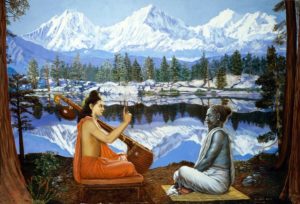In Visnupura
From Ghantasila, Syamananda Prabhu sent Rasikananda to Chakulia, whereas he himself went to Nilachala[1].
After spending some days there, in 1610 AD he again went to Vrindavana, where he met Srinivasa Acarya. Soon Rasikananda also arrived from Utkal to Vraja to have darsana. He met Syamananda Prabhu in the temple of Sri Kesavadeva in Mathura. After having darsana of the twelve forests, gardens and other holy places, Syamananda Prabhu went back to Utkal.
In 1613 AD, Syamananda Prabhu, Srinivasa Acharya and Ramacandra Kaviraja[2] went to Visnupur via Santipur, Katwa, Ambika and Jajigram. The King there, Virahambir, met Sri Syamananda Prabhu for the first time and came to the conclusion that he was many times more spiritually advanced than he had heard.
From there, Syamananda Prabhu left for Sri Nrisinghpur.
Rasikananda Prabhu committed to execute his Gurudeva’s order, who placed his hand on his head and mercifully imparted complete power unto him.
After that Syamananda went to Chakulia and also ordered Damodara Misra to distribute Sri Hari Nama in every house in Utkal.
[1] Nilachala or Niladri are other names for Jagannatha Puri. Nilachala means “blue mountain”.
[2] Srila Narottama Dasa Thakura has sung: “O Acarya Prabhu (Srinivasa), please bestow your mercy upon me. I pray that I might also have the association of Ramacandra.” Sri Ramacandra Kaviraja was the disciple of Srinivasa Acarya Prabhu and the very intimate friend of Narottama Dasa Thakura. His father was Ciranjiva Sena and mother Sri Sunanda. “Ciranjiva Sena was a pure devotee very much loved by Narahari Sarkar and the other residents of Sri Khanda. He was extremely learned in all matters and his wife was very chaste and gentle. Her activities were completely transcendental.” (Caitanya Caritamrita Madhyalila. 11.92)
The purport of Srila Prabhupada to this verse is enlightening:
“The symptom of a living being is that he cannot remain silent even for some time. He must be doing something, thinking of something or talking about something. Generally the materialistic men think about and discuss subjects which satisfy their senses. But as these things are exercised under the influence of the external, illusory energy, such sensual activities do not actually give them any satisfaction. On the contrary, they become full of cares and anxieties. This is called māyā, or what is not. That which cannot give them satisfaction is accepted as an object for satisfaction. So Nārada Muni, by his personal experience, says that satisfaction for such frustrated beings engaged in sense gratification is to chant always the activities of the Lord. The point is that the subject matter only should be changed. No one can check the thinking activities of a living being, nor the feeling, willing or working processes. But if one wants actual happiness, one must change the subject matter only. Instead of talking of the politics of a dying man, one might discuss the politics administered by the Lord Himself. Instead of relishing activities of the cinema artists, one can turn his attention to the activities of the Lord with His eternal associates like the gopīs and Lakṣmīs. The almighty Personality of Godhead, by His causeless mercy, descends to the earth and manifests activities almost on the level of the worldly men, but at the same time extraordinarily, because He is almighty. He does so for the benefit of all conditioned souls so that they can turn their attention to transcendence. By doing so, the conditioned soul will gradually be promoted to the transcendental position and easily cross the ocean of nescience, the source of all miseries. This is stated from personal experience by such an authority as Śrī Nārada Muni. And we can have the same experience also if we begin to follow in the footsteps of the great sage, the dearmost devotee of the Lord.”
This is a section of the book “Syamananda, the Joy of Radharani (English)”.
To buy the complete book, click above
Post view 296 times



